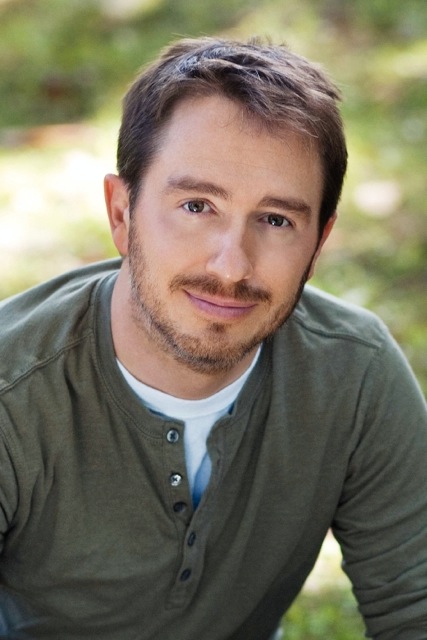 |
| photo: Kevin Millard |
|
Wiley Cash is from western North Carolina and has a Ph.D. in English from the University of Louisiana-Lafayette. He has held residency positions at Yaddo and the MacDowell Colony and teaches in the low-residency MFA program at Southern New Hampshire University. He and his wife live in West Virginia. A Land More Kind Than Home is his first novel.
A Land More Kind Than Home is written in the alternating voices of several different characters; an elderly woman, a middle-aged man, and a nine-year-old boy. Which of these voices was the most difficult for you to write and which, if any, the easiest?
I don't know if any one of the voices was easier or harder to write than the others; there were hard and easy things about each one. For example, Jess's voice seemed very easy at first because it was fun to go back and think about all the things I enjoyed doing when I was nine: playing outside in the creek and in the woods, spying on adults, shooting basketball, etc. But so many of Jess's actions (and even his inactions) have repercussions, and it was painful for me to think about the fear and uncertainty he felt when trying to process all the things he was seeing and hearing. His mother believes she's witnessed a miracle. Jess knows it isn't true, but he's hesitant to tell her for two reasons: she'll know he was spying on the adults in the church and it will crush her hope that her older son will ever speak; that's a lot of pressure to put on a nine-year-old, and it's a complex emotion to portray through a nine-year-old's narration.
Clem's voice was challenging because he's so stoic. Plus, it's hard to have characters share their emotions, especially in first person, without having them tell the reader "I'm sad/mad/happy/depressed." Because Clem isn't going to tell the reader how he's feeling, I had to figure out a way for his emotions to be portrayed. My own father is a lot like Clem, and I thought about how my dad gets quiet when he's angry or disappointed, about how his one-word answers say more than long-winded monologues ever could. Never in my life have I heard my dad say, "I'm sad" or "I'm feeling happy," but I know he feels the same things I feel, whether he says it or not. I can be around my dad for 30 seconds and tell what kind of mood he's in or what he's got on his mind. In writing Clem's voice, I just had to remember the signs my dad gives that portray his emotions.
Adelaide's voice was really fun to write because she's smart and she doesn't hold anything back. A lot of my paternal grandmother goes into Adelaide's voice; Lucille Adeline Cash didn't care who you were or where you were from--she was going to tell you what was on her mind. She was tough, but she had a soft heart and a kindness to her that could disarm people. Aside from my grandmother, American literature is full of old wise women like Adelaide, and I borrowed from a lot of those models: Ernest Gaines's Miss Jane Pittman, Thomas Wolfe's Eliza Gant, Toni Morrison's Pilate Dead. My biggest challenge in writing in Adelaide's voice was capturing her diction and vocabulary. It required a lot of historical research, and I'm so thankful for all the folktales and mountain reels that can be found in public collections. But, more than that, I'm thankful that I can still hear my grandmother's voice so clearly in my mind.

Although the novel is very much a story about the relationship between fathers and sons, it is as much about the absence of mothers. All the characters in the novel have mothers who have abandoned them, either literally or figuratively. This is a striking theme in the novel. Can you explain how it developed for you?
That's a great question, and it's a question I hadn't thought of until now, which means I'm completely unprepared to answer it! At the risk of furthering stereotypes, perhaps mothers are largely absent from this novel because they're linked so closely in our collective psyche with the act of nurturing. The boys' mother, Julie Hall, is nurturing in her own way--she makes Christopher's quiet box and fusses over Jess's splinter and clothes--but she seems just as interested in coping with the fact that her needs aren't being met as she is in nurturing her children. Adelaide is a mother figure, but she's more of an earth mother--the woman who cares for the community collectively instead of individually. All that to say this: perhaps I was interested in whether or not these men (Sheriff Clem Barefield, the boys' father and their paternal grandfather) could provide enough solace and sanctuary to see Jess through this tragedy. All of the men have failed their sons in one way or another, and now they have a chance to protect and nurture an innocent boy. I've gotten a lot of questions from readers about whether or not Jess is going to be okay. If he had a mother or a grandmother around I don't think readers would be so uneasy. I just wanted to see what these men would do if they were given a chance to do the right thing. I think Jess is going to be fine.
There is a great deal of slow-burn suspense and a pervasive sense of the sinister throughout, but A Land More Kind Than Home does not read like a traditional crime novel. Did the suspense and thriller elements come into play for you later in the writing process, or did the novel start as more of a traditional mystery?
When I started writing what would become the novel, I envisioned it being a short story told through Jess's voice. The first line I wrote was "I didn't know Pastor Chambliss had killed my brother until later that night," but then I couldn't get Jess to say anything after that! I realized that other folks may have to step in and tell their part of the story. I began experimenting with Ben (the boys' father) and Jimmy (their paternal grandfather), but something about their voices and perspectives never seemed right. I moved on to Clem and Adelaide, and their voices jumped off the page at me, and I realized they were giving me an outsider/insider perspective of the church. After that, Jess's voice came back and he grew to represent the confusion at the center of the novel.
With these three pretty disparate voices, at first it was hard to find a sense of cohesion when attempting to tell the story through them. It wasn't until I found that traditional arc of story (rising action, climax, falling action, resolution) that I was able to plug in these narrators at fitting points in the novel; it was almost like solving a math equation, meaning I figured out what emotional value or relevant information was missing at X point in the story, and I plugged in a character's voice and tale to fill the hole. It sounds very inorganic now, but I really felt my way through this novel and let the story lead me. I didn't know that it could even be defined as a mystery or a thriller until I'd finished it. During the writing process, I was only aware that I was writing about a community through that community's eyes.
What was the most challenging aspect of writing this novel for you?
The early drafts of the novel were written while I was in graduate school in Lafayette, Louisiana, and the later drafts were written and all of the revision was done while I was teaching at Bethany College in West Virginia. I wanted this novel to feel thick with the atmosphere of western North Carolina, but I obviously wasn't anywhere near that place while I was writing it. But that's probably the place I love more than any other in this world, and I wrote about the landscape to honor it and experience it as if I were there. But writing about a place you love but can't visit whenever you'd like is challenging.
First, I wanted to write an atmospheric novel in which place was just as important a character as the protagonist and antagonist. But because I wrote this novel while I was in school and revised it while I was in my first year of teaching a 4/4 load, I had to take long breaks from it. Sometimes it was difficult to go back and re-immerse myself in the place I'd created on the page. But I can tell you that music helped a lot; western North Carolina musicians like Malcolm Holcombe and Shannon Whitworth really took me back there, as did the photography of folks like Rob Amberg and Tim Barnwell. Of course I went back to the mountains of North Carolina every chance I got. My sister and her family live in Burnsville, which is right next door to where this novel is set in Madison County, and I've still got a lot of friends who don't mind me showing up for a weekend at their homes in Asheville.
Second, it's hard to write about a place you love while staying true to what it is. You don't want your romantic perception of that place to cloud the reality of what it is. You also don't want to disappoint or offend anyone who calls that place home. I love the North Carolina mountains and I longed for them every second I sat down at my desk to write about them; I hope people who read this book can feel that.
 It is almost impossible for authors to predict how their books will be received or how they will find their way in the world. What has surprised you the most about the response to A Land More Kind Than Home?
It is almost impossible for authors to predict how their books will be received or how they will find their way in the world. What has surprised you the most about the response to A Land More Kind Than Home?
My dream has always been to have a book published, so early on my wife and I decided that that was going to be the pinnacle of this entire experience; there'd never be a moment more exciting or pure or honest as the moment when we learned that William Morrow had purchased the novel. Nothing good or bad has exceeded the emotion of that moment, and I don't know that it ever will. I feel really fortunate that the book has been well received by critics and readers, and I feel really fortunate that William Morrow/HarperCollins has given me such incredible support, but even now my heart's fluttering thinking about the night I called my wife on her way home from work.
Aside from that, the best and most surprising thing about this whole experience is how many good people I've met and befriended. From my agent and publisher to independent bookstores to bloggers and librarians, I feel like my circle of friends has expanded ten-fold, and I'm so thankful that there are so many people around the country who support authors and their books and are willing to have beers with them whenever they drop into town. Social media plays a pretty big role in some of those relationships, but so does our common interests in literature and/or beer.
A Land More Kind Than Home raises many interesting questions about faith, family and the corrosive nature of secrets--all ideal for book club discussions. What, in your opinion, would be some good jumping-off points for book clubs to begin their discussions about the novel?
I love book clubs, and what I especially love is their passion for the books they select and discuss. By the time my book is up for discussion, book club members have invested money in purchasing it, they've invested time in reading it, they've invested time in thinking about things to talk about with their group, maybe they've even thought about questions to ask me. After that kind of time, money and energy is invested, readers feel a real ownership of a book and they often have strong opinions concerning it, and they should.
I've enjoyed visiting book clubs in person and through Skype, and we've discussed many issues found in the novel: the role of evil and the way it can fester in our communities; how truth is sometimes manipulated by those who seek power; if second chances are sometimes necessary for healing; the effect of community on the lives of children.
Book club members often ask me very specific questions like "How could Julie Hall put her child in danger?" or "What does the title mean?" Sometimes, before I can even answer, another member will jump in and share an opinion. I love it. That's what every writer wants; it's great to know your book has been read, but it's even better to know people feel strongly enough to sit around and talk about it. Of course, they may be there for the wine, but that's okay too. --Debra Ginsberg, author



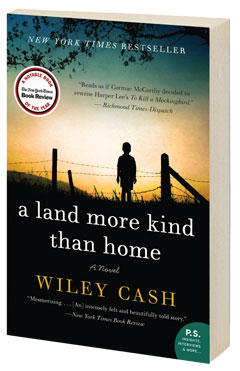
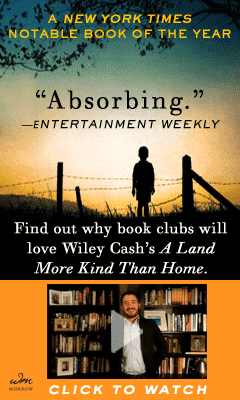
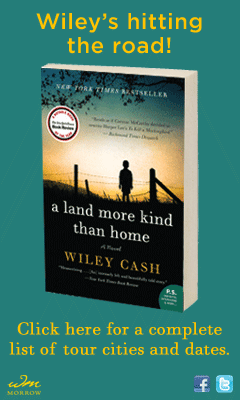
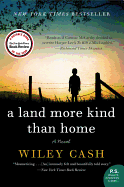



 It is almost impossible for authors to predict how their books will be received or how they will find their way in the world. What has surprised you the most about the response to A Land More Kind Than Home?
It is almost impossible for authors to predict how their books will be received or how they will find their way in the world. What has surprised you the most about the response to A Land More Kind Than Home?